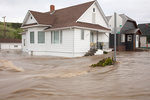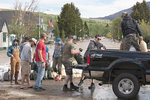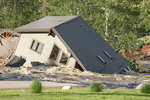Clear, 61° F
Many Park County residents impacted by the floods throughout the greater Yellowstone ecosystem were well-prepared for a natural disaster, thanks in part to the local office of Homeland …
This item is available in full to subscribers.
The Powell Tribune has expanded its online content. To continue reading, you will need to either log in to your subscriber account, or purchase a subscription.
If you are a current print subscriber, you can set up a free web account by clicking here.
If you already have a web account, but need to reset it, you can do so by clicking here.
If you would like to purchase a subscription click here.
Please log in to continue |
|



Many Park County residents impacted by the floods throughout the greater Yellowstone ecosystem were well-prepared for a natural disaster, thanks in part to the local office of Homeland Security.
“Most of the residents had the things they needed to be self-sufficient for days to weeks — everything they needed to evacuate or shelter in place,” said Jeff Martin, director of Homeland Security for Park County.
Martin said local residents were proactive over the years, working diligently with Park County Homeland Security to become educated about how to prepare for a disaster like river flooding. Park County residents attended community meetings and signed up for email lists to give them tips on how to prepare for and “understand threats,” Martin said.
The job of the county’s Homeland Security office is to prepare people for disasters, natural or otherwise, he said.
“The preparations involve any natural or man-made disaster,” Martin said. “We’re more of an emergency management agency.
“On the front side, you’ve got management and mitigation,” he continued. “I have to give credit to Jack Tatum [his predecessor] for preparing residents for a disaster.”
Martin also emphasized the value of volunteers who participated in the department’s Community Emergency Response Team (CERT), a national program that offers local residents basic training in disaster preparedness and certifies them.
“I do want to give credit to our CERT team,” Martin said of the local volunteers. “They kept us ahead of the game with intel and allowed our first-responders to do their other jobs.”
Like everyone else in Park County, the flooding caught Martin by surprise. However, the Homeland Security regional director emphasized the agency is all about being prepared.
Food, water and shelter are the first needs that must be met, Martin pointed out. Other considerations are medicine, pets and livestock, he said, noting that animals also require food, water and shelter.
“Obviously, with the amount of water that came through the county, you can’t prevent that,” Martin said. “We saw, especially up in Crandall, they saw a high volume of water. When there’s so much water coming through, it’s hard to stop. It was an impressive sight — just how much water was coming down that river in Crandall.”
One of the key priorities for Park County Homeland Security was supplying sandbags. Another function entailed going from house to house and property to property, taking notes of who was evacuating and who wasn’t. Department personnel and volunteers then followed up with residents who opted not to evacuate to make sure they were all right, Martin reported.
“Evacuations are pretty much at the discretion of the sheriff’s [office],” he said.
The determination about who should evacuate and when is based largely on weather reports and the anticipation of rising river flows, Martin explained.
“The first priority is to figure out … how much water is coming down the hill,” he said. “We were at a point in the evacuation process where we knew what these water levels were going to look like from sources like the National Weather Service. By that point, people who had chosen to evacuate were already gone.”
Martin was impressed that Park County residents were not only well-prepared but had a firm grasp of whether they needed to evacuate their homes and properties.
“Going around and asking people, ‘Do you feel comfortable evacuating?’ that was never necessary,” he said. “People who live there, they know their area better than anyone else.”
Current Status
As of Wednesday, rivers affected by floods in Yellowstone National Park and surrounding areas had subsided enough to no longer pose an immediate threat to Park County residents. However, anticipated warm temperatures could cause more flooding this weekend. If snowpacks melt and inundate rivers flowing down from Montana into Wyoming, it could be a disastrous repeat performance.
For now, however, a sense of calm has set in.
“We’re pretty much in the recovery phase,” Martin said. “There’s a process where you get well-back on track.”
The local Homeland Security director said one of the highest priorities now is making sure people have usable water. Once people get their water wells “back on line” they can obtain testing kits to make sure the water is up to standards and drinkable, Martin said.
“We’ve been working with public health to get those kits available,” he said. “The lab is in Cheyenne, so there’s a quick turnaround time.
“The first thing we go through during the recovery process is just making sure people can survive.”
After ensuring people have their basic needs met, the next priority is to get water systems up and running and remove debris from roadways, driveways and yards.
Moving Forward
By mid-week, the Park County Homeland Security department was focused on monitoring upcoming weather forecasts to determine the severity of flooding threats in the coming days.
“We’re keeping an eye on the hydrological levels by watching flow meters of the water — how much water is coming downstream,” Martin said.
Park County residents impacted by flooding — and those people who fear future floods might hit them, their homes and properties — can contact the local Homeland Security office for advice and assistance. Personnel and volunteers will go to people’s homes and properties, Martin said. They can bring water supplies, and are happy to educate homeowners and landowners about what supplies they need, and how to stock up for a coming disaster.
“Every case is different,” he said. “I would encourage people to call the office and we can talk about being prepared — being prepared to stay, and being prepared to go.”
Contact: Park County Homeland Security, 1131 11th St, Cody, WY 82414; 307-527-1860.